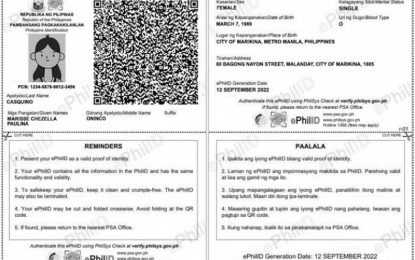
DIGITAL VERSION. The Philippine Statistics Authority (PSA) in Negros Oriental has so far distributed the printed form of the national identification card or ePhilID, to more than 36,000 PhilSys registrants in the province. The ePhilID has the same functionality and validity as the physical national ID card that can be used immediately by its owner while awaiting the delivery of the physical national ID card. (Photo courtesy of the PSA website)
DUMAGUETE CITY – The Philippine Statistics Authority (PSA) in Negros Oriental has so far distributed more than 36,000 ePhilID cards in the province amid public clamor over the non-delivery of the physical national identification cards by the Philippine Postal Corporation (PHLPost).
Engr. Ariel Fortuito, chief Statistical Analyst and PSA provincial head, said they have intensified their efforts to hand out the ePhilID cards so that those registered under the Philippine Identification System (PhilSys) can use them already sans physical copies.
“The ePhilID is a digital version which has the same functionality and validity as the physical card although it is just in printed form on paper. People can use them while awaiting the release of the physical PhilID version,” Fortuito told the Philippine News Agency in an interview Thursday.
Given the millions of PhilID cards that the PHLPost has to deliver across the country, Fortuito said it would take a long time for PhilSys registrants to get their individual national ID cards.
To address this dilemma, the PSA here started in December downloading, printing, and distributing the ePhilID cards but Fortuito said they need the assistance of the barangays and public cooperation to maximize the coverage.
As of January this year, 36,082 ePhilID cards were released, representing 92.28 percent of the 39,100 PhilSys registrants whose names were initially included in the PSA’s list to be downloaded at the provincial level, he said.
Fortuito said they are just barely scratching the surface as a total of 1,017,903 individuals in Negros Oriental, aged at least 5 years old and up, had already signed up for the Step 2 Registration of PhilSys.
He added that many registrants have already received their physical cards, but he could not say the actual numbers.
He assured that those who are issued ePhilIDs can still receive their physical cards.
The process is tedious, he explained, because the list of “downloadable registrants” for the printing of the ePhilIDs will come from the PSA central office.
Initially, the PSA here required the registered individuals to bring their transaction slips so they can be issued an ePhilID but only a few thousand had responded, Fortuito said.
The PSA has now adopted a “print and delivery strategy” but problems arise sometimes in the location of the owners of these ePhilID cards, he said.
Fortuito is hopeful that the barangays will help them in the location and distribution of the national ID cards.
He is also encouraging PhilSys registered citizens to use the digital version instead, which can be downloaded and saved on their mobile phones and can be used as a legitimate government identification. (PNA)
